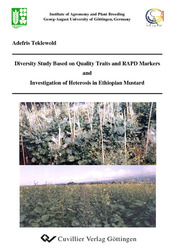| Fachbereiche | |
|---|---|
| Buchreihen (96) |
1379
|
| Nachhaltigkeit |
3
|
| Gesundheitswesen |
1
|
| Geisteswissenschaften |
2367
|
| Naturwissenschaften |
5407
|
| Mathematik | 229 |
| Informatik | 319 |
| Physik | 980 |
| Chemie | 1364 |
| Geowissenschaften | 131 |
| Humanmedizin | 243 |
| Zahn-, Mund- und Kieferheilkunde | 10 |
| Veterinärmedizin | 108 |
| Pharmazie | 147 |
| Biologie | 835 |
| Biochemie, Molekularbiologie, Gentechnologie | 121 |
| Biophysik | 25 |
| Ernährungs- und Haushaltswissenschaften | 45 |
| Land- und Agrarwissenschaften | 1004 |
| Forstwissenschaften | 201 |
| Gartenbauwissenschaft | 20 |
| Umweltforschung, Ökologie und Landespflege | 148 |
| Ingenieurwissenschaften |
1793
|
| Allgemein |
98
|
|
Leitlinien Unfallchirurgie
5. Auflage bestellen |
|
Erweiterte Suche
Diversity Study Based on Quality Traits and RAPD Markers and Investigation of Heterosis in Ethiopian Mustard
Adefris Teklewold (Autor)Vorschau
Inhaltsverzeichnis, Datei (74 KB)
Leseprobe, Datei (45 KB)
Hitherto, the cultivation of Ethiopian mustard as source of edible oil is limited to Ethiopia only. Although its agricultural potential is beginning to be recognized in some other countries, the crop is rather a subject of experimental investigation than of large-scale production. Its commercial and production acceptance and subsequent spread within Ethiopia and elsewhere seems largely restricted by its low oil and meal quality. As an oilseed crop less important elsewhere, the crop suffers from lack of research investment to generate basic and applied information needed to improve its productivity and quality. Diversity for seed quality traits and random amplified polymorphic DNA (RAPD) markers among germplasm collection from Ethiopia and other countries are not assessed and documented. Genetic information that is essential to improve seed yield and its components is meagre. The phenomenon of heterosis that has achieved great success in the other oilseed Brassicas is not investigated so far. To address some of the above mentioned information gaps, this study comprising a series of laboratory and field experiments was carried out with the following objectives: (1) to asses the level of variability for some seed quality traits in segregating progenies; (2) to asses the genetic diversity in relation to geographic origin within Ethiopia and out side Ethiopia using RAPD markers; (3) to determine the level of heterosis and variation in combining abilities for yield and its components in inbred- and population-derived F1s; (4) to identify pre-harvest plant characteristics and yield components related to yield heterosis ; (5) to estimate genetic parameters of seed yield and its components; (6) to empirically test the predictive value of parental divergence as determined by DNA markers, phenotypic traits and geographic origin to heterosis; and (7) to suggest breeding strategies for utilizing heterosis in Ethiopian mustard.
| ISBN-13 (Printausgabe) | 3865375294 |
| ISBN-13 (Printausgabe) | 9783865375292 |
| ISBN-13 (E-Book) | 9783736915299 |
| Sprache | Deutsch |
| Seitenanzahl | 174 |
| Auflage | 1 Aufl. |
| Band | 0 |
| Erscheinungsort | Göttingen |
| Promotionsort | Göttingen |
| Erscheinungsdatum | 20.07.2005 |
| Allgemeine Einordnung | Dissertation |
| Fachbereiche |
Land- und Agrarwissenschaften
|








